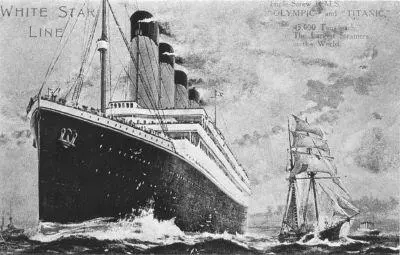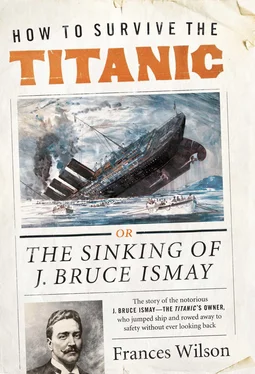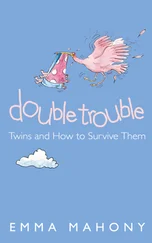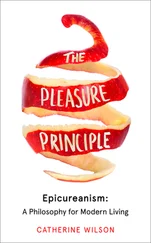At the same time as he describes the Titanic as resembling ‘a Huntley and Palmer biscuit tin’, the romantic in Conrad understands, although he will never admit it, the romanticism of this particular ship, from its fatal name onwards. Conrad responds powerfully to symbols; he knows that the Titanic represents more than just profit, that there was something transgressive in her arrogant challenge to the gods, that she had about her an element of the sublime. Conrad says that he is on the side of the seamen but he is really on the side of the sea, that creature of ‘unfathomable cruelty’, and he both admires and mocks those with the audacity to float ‘in the face of his frown’. The Titanic assumed that the ice would part for her, that she could control the waves, that her squash court and French cafe could dazzle and defy what for centuries has smashed boats and wrecked men simply because it could. The Titanic ’s attempt to seduce the sea with her glamour appeals to the writer in Conrad.
The more distance he put between himself and his life as a mariner, the more Conrad idealised ships and the ‘brotherhood’ of sailors, and the more he romanticised the time in which he had been, for the best part, bored and disillusioned. He remembered the displacement of sail by steam as ‘a swift doom’ but the vessels had been operating side by side for years. Conrad constructed a myth in which an enchanted world abruptly ended and a commercial world began. ‘No doubt,’ he said, ‘the days thus enchanted were empty, but they were not so tedious as people may imagine.’ Or perhaps they were. What has changed for Conrad in the replacement of sail by steam is the role of the sea in the imagination. At one time, a traveller would leave the conditions of shore behind to find ‘in the ship a new kind of home’. He now, especially when crossing the Atlantic, ‘brings the conditions of shore life with him on board’. The sailing ship made a man free, while the modern steamer is a ‘prison’.

Advertisement for the Olympic and Titanic, 1911
Conrad’s problem is that, like Marlow, he is modern as well as being a Romantic. He is a product of the Titanic age with its love of technology and its ‘speed lust’, as a writer in the Cornhill Magazine described the acceleration of everything in 1909. Conrad had no interest in bigness, and none whatever in what E. M. Forster called, in Howards End, the ‘clipped words’ and ‘formless sentences’ of the new ‘language of hurry’; but he, like Florence Ismay, loved mechanical velocity. One of the earliest motorists, he drove his Cadillac (which he pronounced ‘Cadiyac’) around the Kentish lanes at a belting pace, taking corners at thirty miles an hour, tooting his horn at foolish pedestrians, missing farm carts by shavings of inches. His young son Borys would accompany him, terrified, fascinated. Conrad in his motor car with his goggles and flat cap was like that other Edwardian speed merchant, Mr Toad: ‘What dust clouds shall spring up behind me as I speed on my reckless way! What carts shall I fling carelessly into the ditch in the wake of my magnificent onset!’
Conrad’s biographers describe him as living three lives — those of a Pole, a mariner, and an English writer — but his was really a double life. Homo-duplex, he said, ‘has in my case more than one meaning.’ Conrad, as Virginia Woolf put it, ‘was a compound of two men; together with the sea captain there dwelt that subtle, refined, and fastidious analyst whom he called Marlow’. 10Marlow’s temperament was closer to that of Conrad’s father, the Polish nobleman, intellectual and leading Red activist, Apollo Korzeniowski, than it was to the nerve-racked, neurotic writer himself. Marlow and Apollo were both wanderers without land, except that Marlow relished his condition while Apollo, whose life was devoted to freeing Poland from Russian oppression, railed against it. Conrad described his father, whom many considered to have been a hero, as having an ‘exalted and dreamy temperament; with a terrible gift of irony and of gloomy disposition’.
Jozef Teodore Konrad Korzeniowski was born in the Ukraine in December 1857, five years before Ismay. To celebrate his birth, Apollo produced the following lines: ‘To My Son Born in the 85th Year of Muscovite Oppression, A Song For the Day of His Christening’.
Baby son, tell yourself
You are without land, without love,
Without country, without people,
While Poland, your mother, is entombed.
Conrad’s other mother, Ewa Bobrowska, was also entombed by the time he was seven, dying in northern Russia where Apollo was exiled in 1862. An only child, Conrad was raised by his heartbroken father whose stated object was ‘to bring up Konradek not as a democrat, aristocrat, demagogue, republican, monarchist, nor as a servant and a flunkey of these parties — but only as a Pole’. Apollo was granted conditional parole in 1867 and he returned to Poland with his son, but his spirit and health were broken. The boy’s companions were Apollo’s ‘clouded face’ and his collection of Polish Romantic poetry. ‘Poor child,’ his father wrote, ‘he does not know what a contemporary playmate is.’ Their life was one of confinement; Apollo described the pair of them as the only two people ‘left on this earth’. Apollo’s politics, he said, made him a ‘monk in the Polish order’ whose thoughts were ‘confined in the small cell of patriotism’ while Konradek was living ‘as if in a cloister… we tremble with cold, die of hunger, struggle in the abject poverty of our brothers’. 11
Apollo died in Cracow in 1869, his public funeral becoming a mass patriotic demonstration; thousands turned out to pay a final homage to Poland’s great son whose tombstone reads: ‘To the man who loved his Homeland, laboured for it, and died for it — His Compatriots. Apollo Korzeniowski — victim of Muscovite martyrdom.’ Orphaned at twelve, Konradek was taken in by his down-to-earth uncle, Thaddeus Bobrowski, whose letters to his nephew provide the rare moments of levity in any Conrad biography.
According to his Polish biographer, Zdzislaw Najder, Conrad inherited from his country the ‘heroic virtues of duty, fidelity, and honour’, while he inherited from his father a hatred of Russians, an inflexibility of character, a preoccupation with public duty, a passion for Romantic literature, an ‘exceptionally intense emotional life’ and a tendency to pathological depression. It was Apollo who nurtured the part of Conrad which, as Bertrand Russell put it, ‘thought of civilised and morally tolerable human life as a dangerous walk on a thin crust of barely cooled lava which at any moment might break and let the unwary sink into fiery depths’.
But Apollo did not pass down his love of the earth. His father’s obsession with a homeland left Conrad with only one option: to go to sea, and aged seventeen he jumped… it seems. Bidding farewell to Poland, where he would never live again, Conrad left for Marseilles and the life of a sailor. ‘I verily believe,’ he reminisced, ‘mine was the only case of a boy of my nationality and antecedents taking a, so to speak, standing jump out of his racial surroundings and associations.’ 12Conrad’s writing is filled with boys who go to sea in order to get away from home, but his critics and biographers puzzle over his own desire to leave his landlocked country with its tragic history. He seems too cultured, too bookish, too depressive to endure the solitude and hardships of the nautical life. However, dreams of adventures in far-flung places are typical for young boys. ‘What was truly extraordinary,’ Najder reminds us, ‘was his later career as a writer.’ 13
Читать дальше













